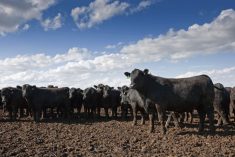BRUSSELS, Oct 2 – Canola futures Wednesday got modest support from news that the European Commission has proposed extending and updating anti-dumping duties against imports of biodiesel from Argentina and Indonesia.
The EC accuses them of selling the product into the bloc at unfairly low prices, an official said.
European rapeseed prices rose, lending support to ICE Futures Canada canola values, although the implications for Canadian canola exports is not clear yet.
The EU executive in May had set provisional duties ranging from 6.8 to 10.6 percent for imports from Argentina and between zero and 9.6 percent for those from Indonesia.
Read Also

U.S. livestock: Cattle futures slow descent
Chicago cattle futures fell on Thursday but to a lesser degree compared to Wednesday’s limit-down drop. Most-active December live cattle…
The Commission spokesperson declined to give details on the duties but the European Biodiesel Board (EBB) said in a statement these were of between 215 and 250 euros ($340) a tonne for biodiesel imported from Argentina and of between 120 and 180 euros a tonne for biodiesel imported from Indonesia.
Duties can vary according to companies but an industry source told Reuters the draft proposal showed the proposed average import duty for biodiesel from Argentina was higher than 230 euros per tonne and close to 170 euros for Indonesia.
Argentina is the world’s No. 1 biodiesel exporter and the two countries represent 90 percent of EU biodiesel imports. Their share of the EU market rose to 22 percent in 2011 from 9 percent in 2009.
The news triggered a jump in European rapeseed futures, as traders said the duty would be higher than provisional tariffs imposed in May.
Biodiesel is mostly made from rapeseed oil in Europe. Palm oil is favoured in Asia and soybean in North and South America.
“It’s good news for European rapeseed which will be more in demand,” a European trader said.
However, EBB considered that the proposed duty levels may not be sufficient to protect the EU market.
A decision would be taken at a meeting of the EU Anti-dumping Committee on Oct. 22-24 where all 28 EU member states are represented. They may oppose the Commission proposal “but it is highly unlikely that this will happen,” the industry source said.














